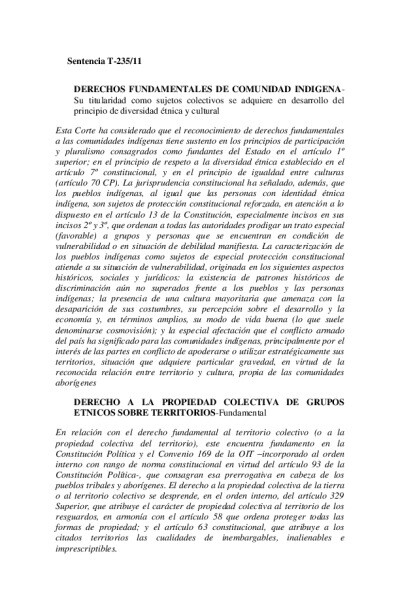
Date
Geographical Area
Andean countries
Countries
Colombia
Keywords
Case Name
Sentencia T-135/11, Corte Constitucional de Colombia
Case Reference
Protection Action T-235/11
Name of Court
Constitutional Court of Colombia
Key Facts
In November 2008 a strong winter season began that affected the municipality of Dagua in Colombia. It generated a complex emergency in the Indigenous community of the Pepitas River Canyon, as the flooding of the Pepitas River made its roads impassable, affected some community members’ homes, and damaged the Indio Agualongo ethnic school.
During 2009, the Pepitas River Indigenous reservation authorities submitted various requests to the Office of Attention and Disaster Prevention of the Municipality of Dagua (Oficina de atención y prevención de desastres del Municipio de Dagua), requiring the repair of the destroyed roads and the buildings affected.
More than a year after the end of the winter season, the authorities had not taken any action to solve the situation of the Indigenous reservation. They did not send workers or machinery to fix the dangerous crossings, nor did they advance agreements with the owners of neighbouring farms to open new roads that did not pose risks to the Indigenous people who were living in the Pepitas River Canyon reservation.
The Indigenous community filed a protection action (acción de tutela) to prevent any community member from suffering an injury to their integrity. They requested the authorities’ intervention to fix the dangerous steps and the houses affected by the winter season of 2008.
During 2009, the Pepitas River Indigenous reservation authorities submitted various requests to the Office of Attention and Disaster Prevention of the Municipality of Dagua (Oficina de atención y prevención de desastres del Municipio de Dagua), requiring the repair of the destroyed roads and the buildings affected.
More than a year after the end of the winter season, the authorities had not taken any action to solve the situation of the Indigenous reservation. They did not send workers or machinery to fix the dangerous crossings, nor did they advance agreements with the owners of neighbouring farms to open new roads that did not pose risks to the Indigenous people who were living in the Pepitas River Canyon reservation.
The Indigenous community filed a protection action (acción de tutela) to prevent any community member from suffering an injury to their integrity. They requested the authorities’ intervention to fix the dangerous steps and the houses affected by the winter season of 2008.
Decision and Reasoning
The Constitutional Court of Colombia determined that Indigenous communities are subjects of special constitutional protection and holders of fundamental rights, collective rights and the right to decent housing in the face of disaster threats. The Court also added that disaster risks acquire constitutional relevance when they affect or threaten the fundamental rights to life, integrity and personal safety.
The Court stated that for the administrative authorities, it is imperative to develop suitable and efficient tools that allow the relocation of a population settled in areas classified as high risk and carry out the administrative acts essential for those affected to find another place to live in conditions similar to those they previously enjoyed.
Finally, the Court pointed out that in terms of disaster prevention, regardless of the origin of the risks and threats likely to turn into disasters, the loss of life and material costs derived from the disaster depends mainly on the adequacy of plans and programmes for risk prevention.
Furthermore, the Court noted that in terms of disaster prevention, preparedness, and action, the Universal Declaration of Human Rights, the International Covenant on Economic, Social and Cultural Rights, along with other instruments of international law, are appropriate for interpreting State obligations. Although such instruments are part of the so-called ‘soft law’, they allow the scope of such responsibilities to be understood comprehensively and harmoniously with international law.
The Court stated that for the administrative authorities, it is imperative to develop suitable and efficient tools that allow the relocation of a population settled in areas classified as high risk and carry out the administrative acts essential for those affected to find another place to live in conditions similar to those they previously enjoyed.
Finally, the Court pointed out that in terms of disaster prevention, regardless of the origin of the risks and threats likely to turn into disasters, the loss of life and material costs derived from the disaster depends mainly on the adequacy of plans and programmes for risk prevention.
Furthermore, the Court noted that in terms of disaster prevention, preparedness, and action, the Universal Declaration of Human Rights, the International Covenant on Economic, Social and Cultural Rights, along with other instruments of international law, are appropriate for interpreting State obligations. Although such instruments are part of the so-called ‘soft law’, they allow the scope of such responsibilities to be understood comprehensively and harmoniously with international law.
Outcome
The Constitutional Court of Colombia granted protection of fundamental rights to the prevention and attention of disasters of the Pepitas River’s Indigenous community and the decent housing of its members. The Court ordered the mayor of Dagua to repair the affected homes and the Indio Agualongo ethnic school. Additionally, the Court urged all administrative authorities in the field of prevention and attention of disasters at the national level to incorporate the component of differential attention to vulnerable groups in the general policies of prevention and attention to disasters.
Disclaimer
This case law summary was developed as part of the Disaster Law Database (DISLAW) project, and is not an official record of the case.
Document
Document
External webpage